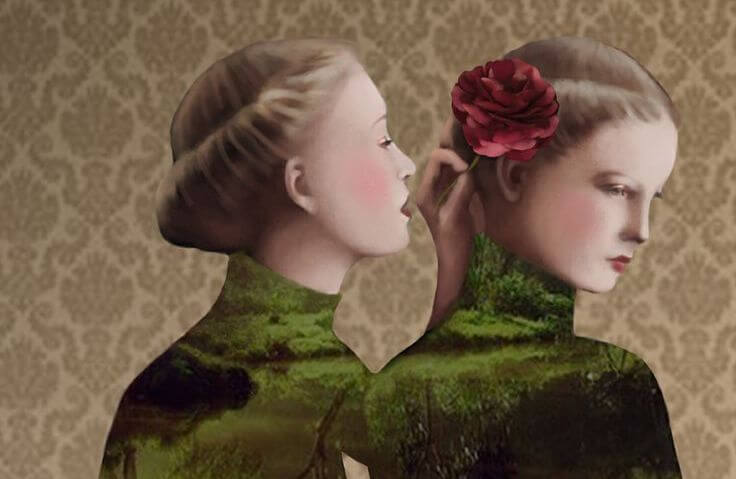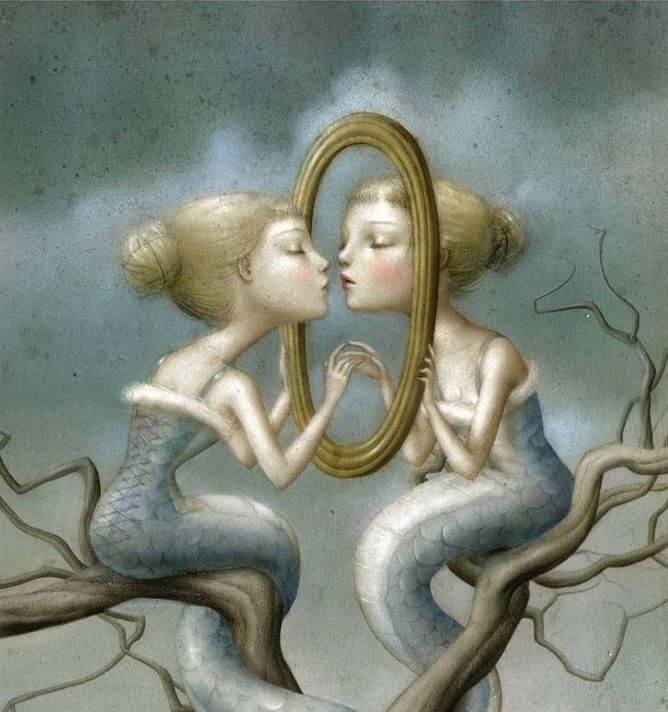The Law of Mirroring: What You See in Others Is Your Own Reflection

When you’re working on your personal growth, you tend to focus excessively only on yourself. However, much of what you can learn is outside yourself or in your trusted environment. Indeed, since ancient times, there have been countless legends that tell us what we see in others reveals sacred information about who we are ourselves.
There have been many psychological studies that affirm that your exterior acts as a mirror for your mind. A mirror in which you see different qualities, characteristics, and personal aspects of your own essence and of your most primitive being, reflected.
In your everyday life, when you see something that you don’t like in others, you tend to reject them or even feel disgusted. The law of mirroring claims that, in some way, an aspect that you dislike in another also exists within you. However, why does this happen? In this article, we’ll explain.
“People reflect back to us the way we speak to them.”
-Laurent Gounelle-
Is the flaw you see outside or in yourself?
The law of mirroring establishes that your unconsciousness, aided by the psychological projection that you carry out at the time, makes you think that the flaw you perceive in others only exists ‘out there’, not in yourself. This psychological projection is a defense mechanism by which you attribute unacceptable feelings, thoughts, beliefs or even actions of your own to others.

This psychological projection occurs during experiences that involve you in emotional conflict or when you feel threatened, both internally and externally. When your mind understands that there’s a threat to your physical and emotional integrity, it tends to attribute them to an object or subject outside yourself. Therefore, you view them accordingly.
Projections happen with both negative and positive experiences. You transfer your own reality without any filters to the outside world, building an external truth based on your own personal characteristics. One such experience of psychological projection happens when you fall in love and attribute to your loved one certain characteristics that only exist in you.
You project your own reality onto your environment
The law of mirroring is evident when you claim to ‘know’ other people very well. However, in reality, what you’re doing is projecting your own reality onto them. When this situation occurs, you’re superimposing your projected vision of yourself on the physical image of that person captured by your senses.

Being aware of what you project onto others allows you to discover what you’re really like. Allowing yourself to be aware of this mental mechanism makes it easier for you to regain control over what’s happening inside you. Consequently, you’re able to take charge and work on those aspects of yourself that you don’t want to maintain or you want to transform to be positive.
It’s essential to remember that everything that comes to you via your senses you take to be true. However, you often don’t recognize the role your own interpretation or subjectivity plays in this process. In fact, you live according to this way of perceiving reality, creating negative distortions that generate discomfort when interacting with the people around you, even with yourself.
If you want to use this natural resource of projecting in a positive way to obtain healthy inner growth, meditation can help. That’s because it makes it easier for you to learn to see things as they really are. Always keep in mind that ‘observing says more about the observer than about who or what’s being observed’.
“What you see in other people is a reflection of yourself. A person of goodness sees goodness in others and a person of evil sees evil in others.”
-Omar Suleiman-
How to use the law of mirroring to your advantage
Do you want to take advantage of the law of mirroring in order to enhance your personal growth, self-knowledge, and to improve your personal relationships? If so, read on for a helpful exercise you can carry out.
The first thing you should do is remember a time when you felt bad about something that happened with another person. For example, after having an argument. After that, ask yourself what that situation reflects in you. There are four possible alternatives :
1. The opposite
It’s often quite disturbing to interact with a person who’s the complete opposite of you. For example, if you’re really organized and are irritated by people who are messy and untidy it’s possible that’s what’s really bothering you is that you’re demanding too much of yourself in terms of organization.
In this sense, you need to reflect. Ask yourself if you could be more flexible. Is it really so necessary to be so rigidly organized? If you stopped being so, would anything terrible happen?
2. Similarity
Another possible scenario is that you see an element of you in the other person that you don’t want to see. In other words, it’s a part of you that you don’t want to accept. If this is this case, you must reflect on what exactly it is that’s hurting you about the other person. Then, consider whether you behave the same way in other situations.
When you see it clearly, that part of you will stop fighting against your own shadow. It’ll help you to change what you don’t like. Bear in mind that, without acceptance, transformation isn’t possible.
3. Selfish expectations
When you have high expectations about a situation or person, and you begin to notice that they don’t match reality, you begin to get upset. In these cases, you need to begin to accept that there’ll always be situations that are beyond your control and that reality will never be as you want it to be. Coming to terms with this will take a huge weight off your shoulders.
4. Consider your actions
When you find yourself feeling like you’re a victim of the person who’s hurting you, you don’t realize that you’re doing exactly the same thing to someone else. In these circumstances, you should reflect on the things that are making you feel bad about how you’re treated, and think about them carefully. In fact, work out if you’re acting in a similar way with someone else. This will certainly change your relationships with others for the better.
When you’re working on your personal growth, you tend to focus excessively only on yourself. However, much of what you can learn is outside yourself or in your trusted environment. Indeed, since ancient times, there have been countless legends that tell us what we see in others reveals sacred information about who we are ourselves.
There have been many psychological studies that affirm that your exterior acts as a mirror for your mind. A mirror in which you see different qualities, characteristics, and personal aspects of your own essence and of your most primitive being, reflected.
In your everyday life, when you see something that you don’t like in others, you tend to reject them or even feel disgusted. The law of mirroring claims that, in some way, an aspect that you dislike in another also exists within you. However, why does this happen? In this article, we’ll explain.
“People reflect back to us the way we speak to them.”
-Laurent Gounelle-
Is the flaw you see outside or in yourself?
The law of mirroring establishes that your unconsciousness, aided by the psychological projection that you carry out at the time, makes you think that the flaw you perceive in others only exists ‘out there’, not in yourself. This psychological projection is a defense mechanism by which you attribute unacceptable feelings, thoughts, beliefs or even actions of your own to others.

This psychological projection occurs during experiences that involve you in emotional conflict or when you feel threatened, both internally and externally. When your mind understands that there’s a threat to your physical and emotional integrity, it tends to attribute them to an object or subject outside yourself. Therefore, you view them accordingly.
Projections happen with both negative and positive experiences. You transfer your own reality without any filters to the outside world, building an external truth based on your own personal characteristics. One such experience of psychological projection happens when you fall in love and attribute to your loved one certain characteristics that only exist in you.
You project your own reality onto your environment
The law of mirroring is evident when you claim to ‘know’ other people very well. However, in reality, what you’re doing is projecting your own reality onto them. When this situation occurs, you’re superimposing your projected vision of yourself on the physical image of that person captured by your senses.

Being aware of what you project onto others allows you to discover what you’re really like. Allowing yourself to be aware of this mental mechanism makes it easier for you to regain control over what’s happening inside you. Consequently, you’re able to take charge and work on those aspects of yourself that you don’t want to maintain or you want to transform to be positive.
It’s essential to remember that everything that comes to you via your senses you take to be true. However, you often don’t recognize the role your own interpretation or subjectivity plays in this process. In fact, you live according to this way of perceiving reality, creating negative distortions that generate discomfort when interacting with the people around you, even with yourself.
If you want to use this natural resource of projecting in a positive way to obtain healthy inner growth, meditation can help. That’s because it makes it easier for you to learn to see things as they really are. Always keep in mind that ‘observing says more about the observer than about who or what’s being observed’.
“What you see in other people is a reflection of yourself. A person of goodness sees goodness in others and a person of evil sees evil in others.”
-Omar Suleiman-
How to use the law of mirroring to your advantage
Do you want to take advantage of the law of mirroring in order to enhance your personal growth, self-knowledge, and to improve your personal relationships? If so, read on for a helpful exercise you can carry out.
The first thing you should do is remember a time when you felt bad about something that happened with another person. For example, after having an argument. After that, ask yourself what that situation reflects in you. There are four possible alternatives :
1. The opposite
It’s often quite disturbing to interact with a person who’s the complete opposite of you. For example, if you’re really organized and are irritated by people who are messy and untidy it’s possible that’s what’s really bothering you is that you’re demanding too much of yourself in terms of organization.
In this sense, you need to reflect. Ask yourself if you could be more flexible. Is it really so necessary to be so rigidly organized? If you stopped being so, would anything terrible happen?
2. Similarity
Another possible scenario is that you see an element of you in the other person that you don’t want to see. In other words, it’s a part of you that you don’t want to accept. If this is this case, you must reflect on what exactly it is that’s hurting you about the other person. Then, consider whether you behave the same way in other situations.
When you see it clearly, that part of you will stop fighting against your own shadow. It’ll help you to change what you don’t like. Bear in mind that, without acceptance, transformation isn’t possible.
3. Selfish expectations
When you have high expectations about a situation or person, and you begin to notice that they don’t match reality, you begin to get upset. In these cases, you need to begin to accept that there’ll always be situations that are beyond your control and that reality will never be as you want it to be. Coming to terms with this will take a huge weight off your shoulders.
4. Consider your actions
When you find yourself feeling like you’re a victim of the person who’s hurting you, you don’t realize that you’re doing exactly the same thing to someone else. In these circumstances, you should reflect on the things that are making you feel bad about how you’re treated, and think about them carefully. In fact, work out if you’re acting in a similar way with someone else. This will certainly change your relationships with others for the better.
This text is provided for informational purposes only and does not replace consultation with a professional. If in doubt, consult your specialist.







